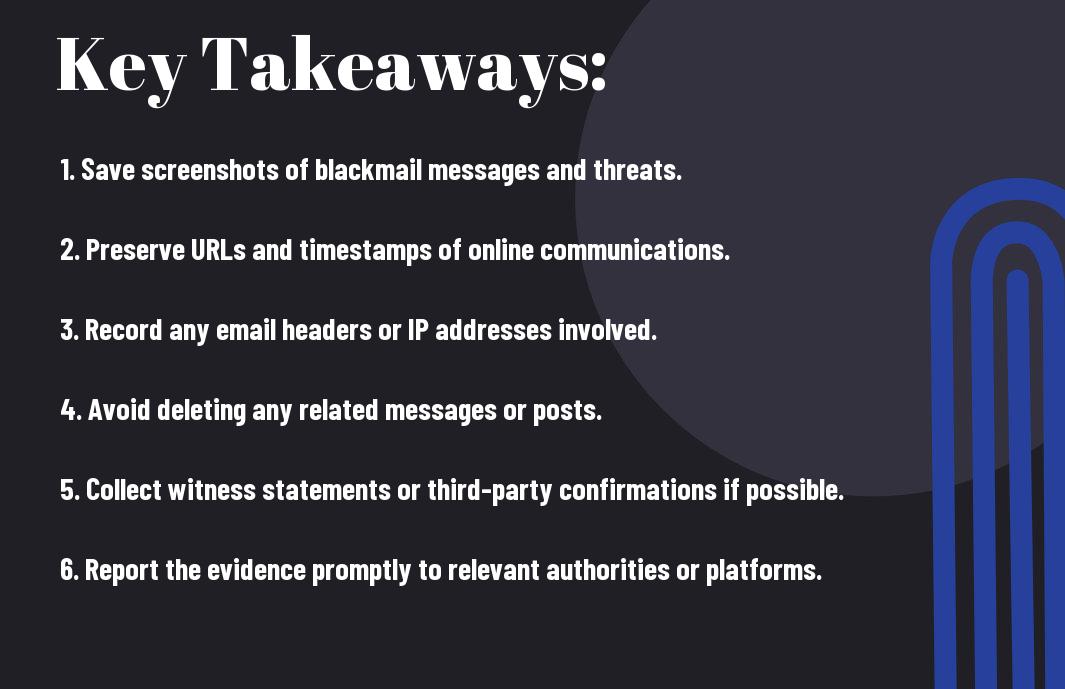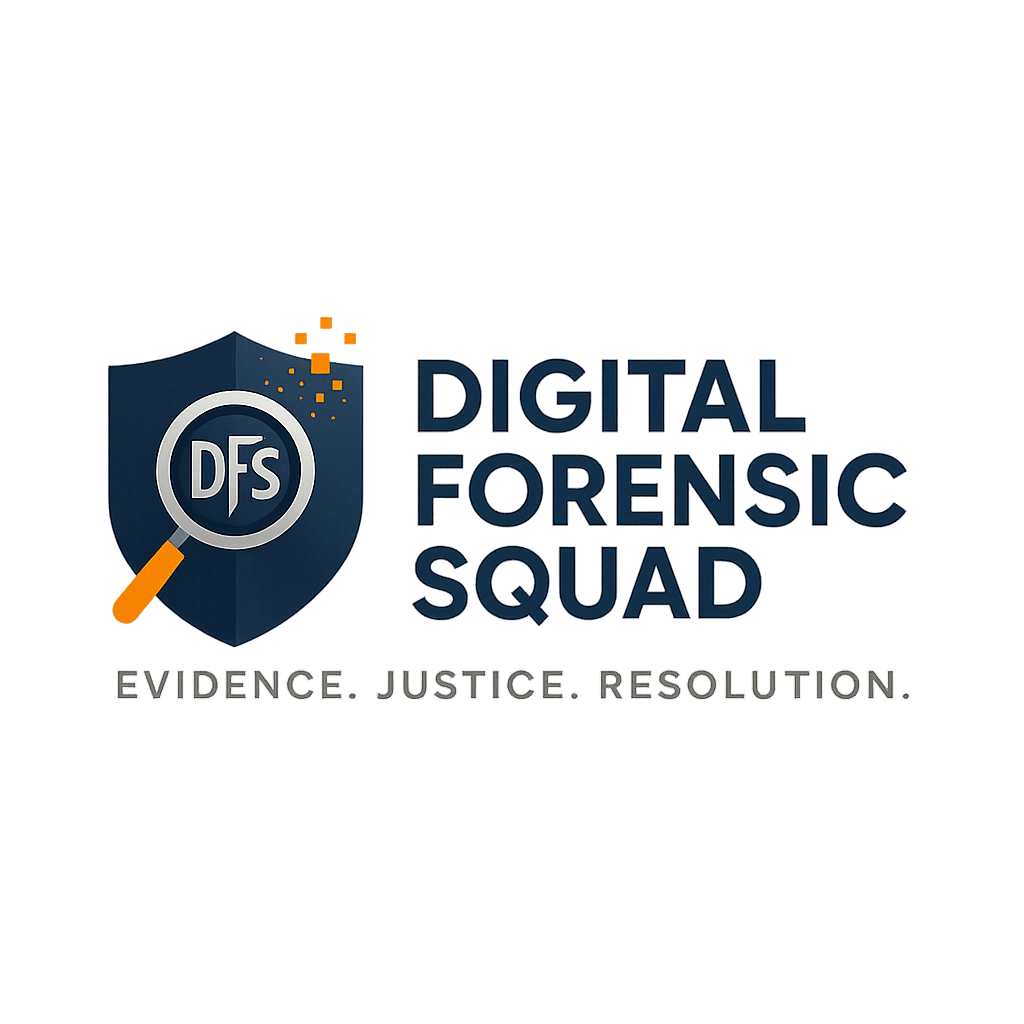It’s vital to gather appropriate evidence if you find yourself a victim of online blackmail. It is also important to know what evidence do you need for reporting online blackmail. The types of evidence you collect can significantly impact the investigation and potential legal action. You should document threatening messages, take screenshots, and save any related multimedia files. Additionally, keeping track of dates, times, and the identities of involved parties will help law enforcement understand your situation better. In this post, we will outline the important forms of evidence needed to effectively report online blackmail. Get in touch with Digital Forensic Squad for assistance on gathering the right actionable evidences for your case.
Key Takeaways:
- Document all communication related to the blackmail, including messages, emails, and screenshots, as they serve as vital evidence.
- Store any relevant information about the blackmailer, such as usernames, account links, and any identifying details that may help investigators.
- Report the incident to appropriate authorities and platforms, providing them with all compiled evidence to facilitate a thorough investigation.
Understanding Online Blackmail
To comprehend the severity of online blackmail, it’s imperative to grasp how it unfolds in the digital space. This form of coercion often involves an individual threatening to share compromising information, images, or videos unless their demands are met. As you navigate the online world, being aware of this malicious behavior can empower you to take appropriate actions if you find yourself a target.
Definition of Online Blackmail
By definition, online blackmail occurs when someone uses threats to manipulate you into complying with their demands, often by exploiting sensitive personal information or content. This can happen on various platforms, including social media, email, or messaging apps, leaving victims feeling vulnerable and desperate.
Common Tactics Used by Blackmailers
With a growing presence online, blackmailers employ various tactics that may catch you off guard. They often use emotional manipulation, claiming to love or care for you, only to turn hostile when you refuse their requests. Other methods include phishing scams, where blackmailers trick you into revealing personal information, or utilizing fake identities to gain your trust before exploiting your vulnerabilities.
A significant tactic used by blackmailers is the threat of disclosing intimate photos or embarrassing information unless you pay a ransom or comply with other demands. They may create fake accounts or impersonate someone you know to establish credibility. In these cases, it’s important to identify these manipulative strategies and take immediate action. Blackmailers often rely on shame and fear to keep you silent, so understanding their tactics can enhance your ability to fight back and seek help without succumbing to their threats.

Importance of Evidence in Reporting
While confronting online blackmail can be incredibly unsettling, having strong evidence can significantly enhance your report’s effectiveness. This information not only helps authorities to investigate and take action against the perpetrator but also provides you with a clearer understanding of your situation. Collecting evidence ensures that you don’t feel isolated during this challenging time and empowers you in the face of such wrongdoing.
Why Evidence Matters
Evidence serves as a foundation to substantiate your claims. By documenting threats, messages, or other interactions, you present a tangible case that law enforcement can act upon. Without concrete evidence, it becomes challenging to demonstrate the seriousness of your situation, leading to potential dismissals of your report.
Legal Implications of Evidence
To effectively navigate the legal landscape surrounding online blackmail, gathering appropriate evidence is vital. This documentation can influence the outcome of investigations, ensuring that you’re protected under the law. A well-substantiated report can lead to civil or criminal actions against the blackmailer, thereby offering you both justice and peace of mind.
Another significant aspect to consider is that legal systems often rely heavily on documented evidence to uphold your rights. If your case goes to court, the presence of strong evidence can enhance the chances of a favorable verdict, potentially leading to harsh penalties for the offender. Moreover, it can also facilitate the process of obtaining a restraining order, providing you with increased security and protection against future threats. Your diligence in securing this evidence not only bolsters your case but also contributes to a broader effort in combating online blackmail.
What Evidence Do You Need For Reporting Online Blackmail
Types of Evidence to Gather
After facing online blackmail, it’s important to gather adequate evidence to support your case. Collecting specific types of information can enhance your report’s credibility. Here’s a breakdown of imperative pieces of evidence you should compile:
| Evidence Type | Description |
|---|---|
| Screenshots | Visual proof of threats or conversations. |
| Communication Records | Dates, times, and platform details of interactions. |
| Financial Transactions | Details of any money exchanged. |
| Account Information | Usernames and profiles involved in the blackmail. |
| Reported Content | Links or copies of any posted threats. |
Assume that having these elements on hand will make your report more effective and persuasive.
Screenshots and Communication Records
Above all, gather comprehensive screenshots of any conversations with the blackmailer. Capture their threats, demands, and any other relevant comments. Additionally, compile communication records that provide timestamps, platform details, and any notice of further harassment. This evidence solidifies your claims and provides a timeline of events.
Financial Transactions and Payment Proof
Records of any financial transactions can serve as critical evidence when reporting online blackmail. If you have made any payments to the blackmailer, ensure you keep a detailed account of these transactions, including receipts and timestamps.
With your financial evidence, be prepared to share details regarding the amounts paid, the method of payment (credit card, PayPal, etc.), and any communication surrounding the transaction. This information highlights the ongoing nature of the blackmail and may support your case significantly in investigations.
Account Information and User Data
User data is a key part of your evidence collection. Document all account information, including usernames, profiles, and any other identifying details related to the blackmailer. This can help authorities track down the perpetrator.
Account information should also include any associated links or previous interactions you may have had with the user. By providing a complete picture, you can assist in efforts to bring the blackmailer to justice and protect yourself from future incidents.
Reporting the Blackmail
Now that you have gathered all necessary evidence, it’s time to take action. Reporting the blackmail is important to protect yourself and potentially help others who may be targeted by the same individual. Act quickly and decisively to ensure the authorities can take appropriate measures against the perpetrator.
Who to Report to
Report the blackmail to your local law enforcement agencies first. They are equipped to handle such cases and can guide you through the process. Additionally, consider reporting the incident to the platform where the blackmail occurred, as they can take steps to block or remove the offender.
How to File a Report
After identifying the appropriate authorities, take the initiative to file a report. You’ll typically need to provide them with a detailed account of the situation, along with the evidence you have collected. Ensure you include information such as the perpetrator’s identity, if known, and any communications exchanged.
File your report with clear and concise details to aid the investigation. Provide all relevant evidence, such as screenshots, messages, or any digital footprints left by the blackmailer. It is vital to maintain a record of your interactions, as this can strengthen your case. In some situations, you might also want to consult with a legal professional to better understand your rights and options moving forward.
Safety Measures While Reporting
Many victims of online blackmail often feel vulnerable during the reporting process. It’s imperative to take appropriate safety measures to protect yourself while seeking help. Always consider reporting from a secure, private location and avoid using the same device or network that the blackmailer may have access to, ensuring your personal information remains confidential.
Protecting Your Identity
Between the need to report the crime and the risk of exposure, safeguarding your identity is paramount. Use anonymous reporting options and be cautious when sharing your contact information. Consider setting up a new email account specifically for this situation to maintain your privacy.
Avoiding Further Victimization
To prevent further victimization, it’s vital to act promptly and decisively. Do not engage with the blackmailer or comply with their demands, which could exacerbate the situation. Instead, gather evidence and report the incident to the appropriate authorities.
For instance, if you receive threats or demands for money, do not pay the blackmailer, as this may encourage additional threats or lead to more serious consequences. Ensure you save all communications for evidence and turn them over to law enforcement. Consider informing trusted friends or family members to provide support, as their presence can be reassuring and help counter feelings of isolation during such a distressing time.

Resources and Support
All individuals experiencing online blackmail need access to reliable resources and support. Whether you require legal guidance or emotional assistance, various organizations are available to help you navigate the situation. Seeking out the right resources can provide you with the tools and reassurance to handle the challenges ahead.
Legal Resources
Along your journey, it’s crucial to understand the legal avenues available to you. Consulting with a qualified attorney who specializes in cybercrime can provide you with tailored advice on how to proceed. Many organizations also offer free legal consultations to help you assess your situation and understand your rights.
Support Groups and Hotlines
Behind the scenes, support groups and hotlines offer invaluable assistance for those affected by online blackmail. Connecting with others who share similar experiences can provide emotional relief, while hotlines can guide you through immediate concerns and next steps.
Plus, joining a support group can foster community and help you feel less isolated. Hotlines such as the National Center for Victims of Crime and RAINN provide 24/7 assistance and can connect you with professionals who understand the complexities of your situation. These resources remind you that you are not alone, and that help is available to overcome the fear and stress associated with online blackmail.
Conclusion
As a reminder, when dealing with online blackmail, it’s vital to gather all relevant evidence to support your case. This includes screenshots of conversations, any photos or videos shared, information about the perpetrator, and record timestamps. Keeping thorough documentation will strengthen your report and help authorities take appropriate action.
FAQ
Q: What types of evidence should I collect when reporting online blackmail?
A: When reporting online blackmail, it’s important to gather as much evidence as possible to support your case. Start by taking screenshots of all communications with the blackmailer, including messages, emails, or social media interactions. Ensure you capture the date and time of each correspondence. Additionally, save any relevant images, videos, or documents that the blackmailer has shared with you. If applicable, record any transaction details if they request money or sensitive information. It’s also helpful to note any user handles, email addresses, or phone numbers associated with the blackmailer.
Q: How can I ensure my evidence is properly documented before making a report?
A: Proper documentation is vital when preparing to report online blackmail. Start by organizing your evidence chronologically. Use a cloud-based service or a secure hard drive to store all collected evidence safely. Besides screenshots and files, consider writing a detailed account of your experience, including the timeline of events and any personal data the blackmailer may have threatened to expose. This organized information can help authorities understand your situation more clearly. When you are ready to report, having everything in order will facilitate the process.


